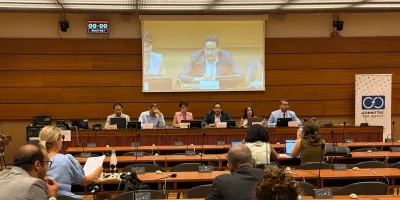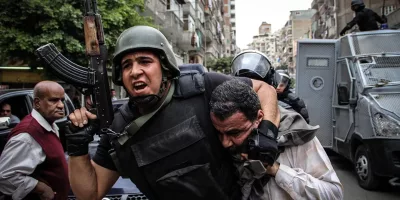Press release
Translated and edited by: Committee for Justice
Geneva: May 23, 2022
The Committee for Justice and ISHR said that despite repeated calls by various UN mechanisms regarding the inhumane prison conditions in Egypt, including denial of family visits, legal counseling and denial of medical care that contributed to the deaths of many prisoners, Egyptian authorities refuse to address these pressing concerns.
Ayman Hadhoud’s death not investigated:
In a joint statement by the two organizations to the Special Rapporteur on prisons at the African Commission for the Protection of Human and Peoples’ Rights, they confirmed the death of 958 detainees, including 9 minors, during the period between June 30, 2013 and December 1, 2019. In some cases, prisoners are released in dangerous health conditions that lead to their death a few days after their release.
The two organizations expressed their grave concerns about the death of the economic expert, advisor and member of the liberal Egyptian Reform and Development Party, Ayman Hadhoud, who died in the custody of the Egyptian security forces after his enforced disappearance more than two months ago.
Hadhoud’s family had reported that his body bore signs of beatings and torture, and that the leaked photos of his body “strongly suggest that Ayman had been tortured or ill-treated before his death.” The Egyptian Public Prosecution also stated that he died on March 5 as a result of cardiac arrest following its investigation into the case and the autopsy. The family’s lawyer also stated that the prosecution is preparing to close the case without further investigations, after refusing to allow them to view a copy of the case file and the forensic report.
Corona virus and overcrowding in detention centers:
The statement touched on overcrowding in detention facilities in Egypt and the risk of a massive spread of Covid-19 inside. Despite that, Egyptian authorities continued to arbitrarily arrest and detain thousands of people in crowded detention facilities, noting that the cells in Egyptian detention centers are small and overcrowded and lack ventilation and sanitary facilities. Families are not allowed to deliver essentials, including food, clothes, medicine, etc., for their loved ones in prison.
The two organizations indicated that Egypt failed to provide transparent information about the vaccination of prisoners. In June 2021, after Abdel Moneim Aboul Fotouh’s lawyer filed a lawsuit before the State Council to demand the vaccination of his client, the state’s attorney submitted to the court that the prison administration had vaccinated only 5,000 detainees. The Covid-19 continues to affect detainees since the prison administration imposed policies that limit the right to receive visits and impose a violation of the right to judicial review.
Solitary confinement as a punishment:
The joint statement also considered the use of solitary confinement by prison administrations to punish prisoners held for political reasons as a systematic matter in Egypt. Some defendants are held in solitary confinement upon their arrest, such as the deputy head of the Strong Egypt Party, Muhammad al-Qassas, who has been held in solitary confinement since his arrest in 2018, and human rights lawyer, Amr Imam, who was arrested in 2019, and writer and poet, Ahmed Doma, who spent 5 years in solitary confinement, which prompted many detainees, recently, to declare their hunger strike in protest against the inhuman treatment, conditions of detention and the excessive use of solitary confinement.
Conditions of female detainees in Egypt:
Regarding the conditions of detention in Al-Qanater Women’s Prison, the two organizations stated that female detainees face torture and gender-based violence in detention with impunity, including humiliating vaginal searches, sexual harassment, and forced genital examinations of transgender women.
The joint statement added that the authorities do not provide any personal care products for female detainees or free sanitary pads, and since sanitary pads are sold in prison for twice their market price, women who are unable to pay for them cannot obtain them, and women are also held in overcrowded cells, and receive inedible food and undrinkable water, and are denied medical treatment.
The Committee on the Elimination of All Forms of Discrimination against Women had expressed deep concern about gender-based violence and the lack of medical care and unsanitary conditions in prisons, where female prisoners are reportedly subjected to strip searches and prolonged solitary confinement as a punishment.
Regarding the conditions of detention for transgender women prisoners, the UN mechanisms raised the problem of the lack of redress and accountability mechanisms for victims of sexual violence, and urged Egypt to urgently address prison conditions and reverse what appear to be deeply entrenched practices that severely violate people’s right to life, the right to freedom from arbitrary detention, the right not to be subjected to torture or ill-treatment, the right to due process and a fair trial, and appropriate medical care.
In its conclusion, the joint statement called on the Special Rapporteur on prisons in the African Commission for the Protection of Human and Peoples’ Rights to issue public statements condemning the violations against detainees in Egypt, and to request a visit to Egypt, including detention centers.






